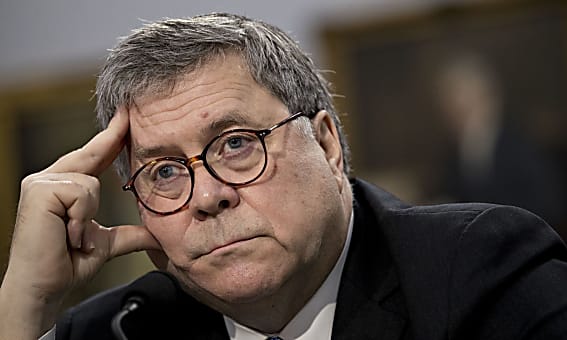
(Bloomberg) -- President Donald Trump on Thursday gave Attorney General William Barr “full and complete authority” to declassify information related to his inquiry into investigations of the 2016 presidential election.
The president, in a memorandum, directed U.S. intelligence agencies to cooperate with Barr’s review, which he has said would look into allegations by Trump and his allies that his campaign was spied upon and that various figures in the Justice Department and the FBI were trying to undermine him.
“Today’s action will help ensure that all Americans learn the truth about the events that occurred, and the actions that were taken, during the last presidential election and will restore confidence in our public institutions,” the White House said in a press release on Thursday night.
Even as the president has granted his attorney general greater power to look into what led to the appointment of Special Counsel Robert Mueller, the White House has refused to allow Representative Jerrold Nadler’s Judiciary Committee see the unredacted version of Mueller’s report on Russian interference in the election, or the underlying evidence.
Trump has invoked executive privilege to prevent former White House Counsel Don McGahn from handing over documents to Nadler’s panel. His fierce determination to fight “all the subpoenas” has kindled demands by a growing number of Democrats to begin impeachment proceedings.
The president, on the other hand, has long asserted that Mueller’s investigation into Russian interference in the campaign was politically motivated and concocted from false allegations. “They want to look at how the whole hoax got started,” Trump said earlier this month. He denied that he had asked Barr to investigate Mueller’s investigation, but said of him: “I am so proud of our attorney general that he is looking into it. I think it’s great.”
FBI Director Christopher Wray testified before a Senate committee that he wasn’t aware of any improper spying, a comment Trump said he found “ridiculous.”
The notion of a so-called deep state plotting against Trump since before his election has been a rallying cry for his supporters and a theme touched on by figures sympathetic to the president, including Fox television host Sean Hannity. The directive gives the attorney general a path to selectively declassify material that may feed that narrative while pieces of the fuller picture may remain classified.
Ned Price, a former CIA senior analyst and national security spokesman in the Obama administration, called the directive “a pretty brazen effort by Trump and Barr to place their thumbs on the scale, bestowing on the attorney general authorities that weren’t afforded to those leading investigations into other elements of the Trump-Russia saga.
“Its just another indication that Trump wants to make this about the purported wrongdoing on the part of the FBI and DOJ, rather than his team’s own efforts to conspire with the Russians.”
Barr told the Senate Judiciary Committee that the Justice Department would determine whether there was any improper “spying” on the Trump campaign, including whether intelligence collection began earlier than previously known and how many confidential informants the FBI used. He suggested his focus was on senior leaders at the FBI and Justice Department at the time.
His review will also examine whether a dossier that included salacious accusations against Trump was fabricated by the Russian government to dupe U.S. intelligence agencies and the FBI, Barr has said.
Congressional Democrats have accused Barr of partisanship in his inquiry.
Barr has chosen Connecticut U.S. Attorney John Durham to head the review, according to a person familiar with the matter.
The review will include working with Wray, CIA Director Gina Haspel and Director of National Intelligence Dan Coats, according to the person. Barr has already talked with Wray and Haspel about the review, the person added.
Trump’s directive came hours after he released an unrelated immigration memo and before a possible announcement on arms sales to Saudi Arabia. What all three moves had in common was a way for the president to exert executive power -- bypassing Congress or exerting more sway over intelligence community officials who worked for other presidents before him
--With assistance from Chris Strohm.
To contact the reporters on this story: John Harney in Washington at jharney2@bloomberg.net;Margaret Talev in Washington at mtalev@bloomberg.net
To contact the editors responsible for this story: Kevin Whitelaw at kwhitelaw@bloomberg.net, John Harney, Justin Blum
For more articles like this, please visit us at bloomberg.com
©2019 Bloomberg L.P.